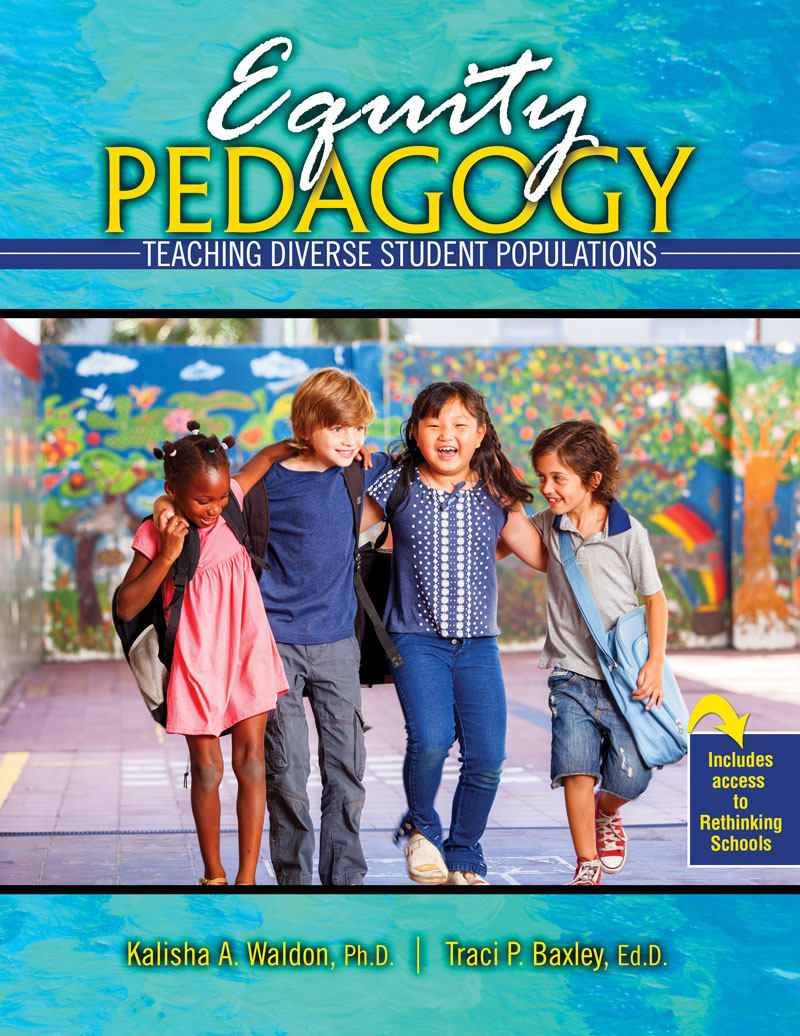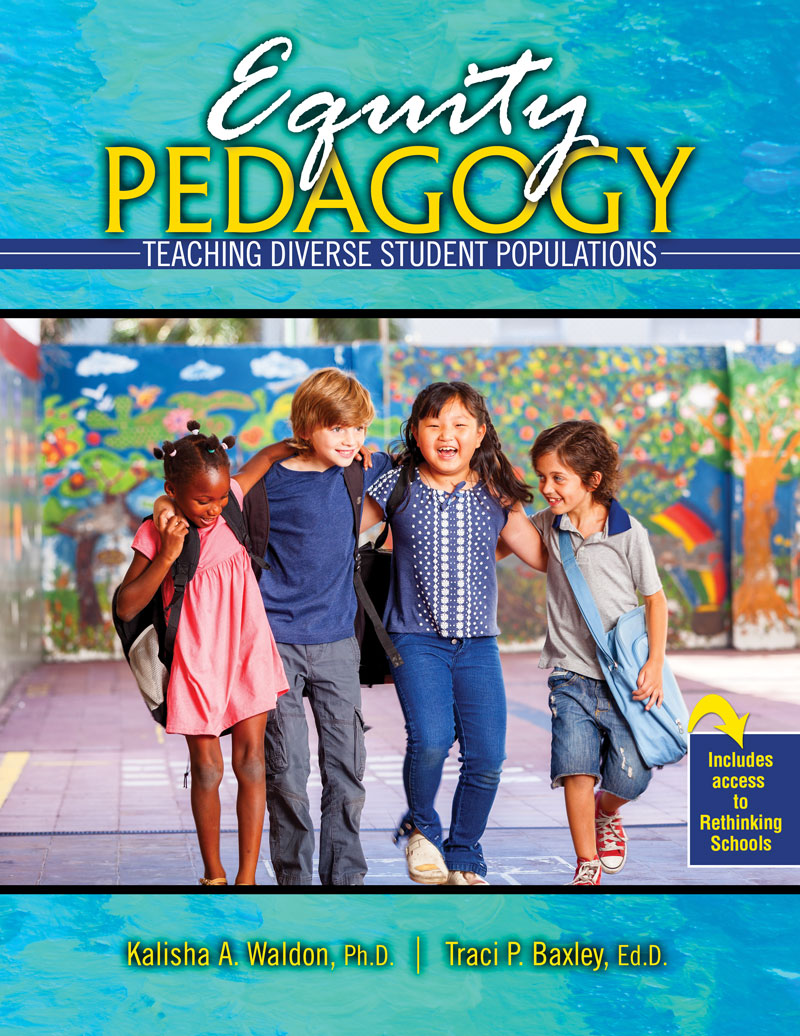Equity Pedagogy: Teaching Diverse Student Populations
Choose Your Format
Equity Pedagogy: Teaching Diverse Student Populations is aimed at introducing pedagogical content knowledge and practices through a critical multicultural lens. The authors’ intent of this text is two-fold:
- to ensure equity in education through the curriculum and for traditionally marginalized student populations and
- to meaningfully engage pre-service teachers and broader audiences in the critical discussion of our role to meet the needs of students in a diverse society.
This is imperative to our understanding of the students we teach, and the need to honor their funds of knowledge, ways of knowing, and cultural experiences in schools.
This text invites readers to problematize their personal knowledge and biases through a series of self-reflective activities. It also engages readers through the integration of case studies, voices from the field, and theoretical foundations through practical applications.
Coming Soon!
- Teacher Resource Bank- PowerPoint presentations, quizzes, online student activities
Preface
Acknowledgments
Dedication i
Forward – Carlos Diaz
Voice in the Field Contributors
Chapter Contributors
Introduction - Why Do We Need Multicultural Education? Reclaiming Our Roles as Professionals in a Democracy by Dilys Schoorman
1 What Is Multicultural Education?
Eliana Carvalho Mukherjee
Voice in the Field: Collateral Damage I: I Can’t Breathe Thomas Baxley, III
Collateral Damage II: Racism 2016 by Tiffany Rhoden
Practical Encounters
2 The Relevance of Culture and Identity: Why It Matters
Nanette Missaghi
Expert Corner: Responsibilities of Schools for Providing Receptive Cultures Carlos Diaz
Practical Encounters
3 Culture Matters: Creating Classroom Communities that Mirror Students’ Lives
Traci P. Baxley and Kalisha A. Waldon
Voice in the Field: Restorative Circles for Building Community and Breaking Down Barriers Martha A. Brown
Practical Encounters
4 Promoting Inclusion for Students with All Abilities
Cynthia L. Wilson, Kathleen M. Randolph & Brianna Joseph
Voices in the Field: Debunking Myths of ELL Learners Sabrina F. Sembiante and Samantha N. Uribe
Practical Encounters
5 Rags to Riches: Honoring the Inherent Richness of Students in Poverty
Kalisha A. Waldon, Traci P. Baxley & Allyson Hall
Inquiry Connector: Homelessness and Hunger in our Community Traci P. Baxley and Kalisha A. Waldon
Practical Encounters
6 Faithism in the Public School: What Educators Must Know to Avoid Religious Bias
Ilene Allgood
Voice in the Field: Why Is a Muslim Child Different than Other Children? Leila Shatara
Practical Encounters
7 It’s Never Too Early: The (In)Visibility and Importance of an LGBTQ Inclusive Curriculum in Elementary Schools
Dominic Grasso
Literature Connections: Practical Suggestions for an LGBTQ Inclusive Curriculum Compiled Dominic Grasso
Practical Encounters
8 Fundamentals of Multicultural Lesson Planning
Allyson Hall
Voice in the Field: Using Backwards Design Michelle Vaughan
Practical Encounters
9 Evaluation: A Multicultural Perspective
Tunjarnika L. Coleman-Ferrell and Roxanna Anderson
Voice in the Field: Leveling the Testing Playing Field Mirynne O’Connor Igualada
Practical Encounters
10 Choice, Voice, and Critical Discourse in the Language Arts Classroom
Traci P. Baxley, Kalisha A. Waldon and Kimberly Rhoden
Voice in the Field: Write from the Heart Kimberly Rhoden
Practical Encounters
11 Social Studies and Multicultural Education: Partners Teaching 21st Century Students Actively to Uphold Human Dignity for All
Rosanna M. Gatens
Voices in the Field: Facilitating Students’ Journey towards Empathy and Advocacy Rachayita Shah and Julie Hector
Practical Encounters
12 Reaching our Diverse Learners through STEM
Chasity O’Malley, Allyson Hall, Dana Hamadeh, Traci P. Baxley, Kalisha A. Waldon, Iris Minor & Ramonia Rochester
Voices in the Field: Using Culturally Responsive Teaching in Math Kyla Williams
Practical Encounters
13 Safe and Accessible: Creating New Spaces for “Arts Education”
Gail Burnaford, Aquil Charlton, Susan Gay Hyatt, & Jeanette McCune with Adjoa Burrowes, Sharmaine Chamberlain, Cheryl Foster, Kari Ratka , and Terry Thomas
Practical Encounters
Appendices
Indian Father’s Plea by Robert Lake
Unpacking the Invisible Knapsack by Peggy McIntosh
Racial Privilege. Interview with Beverly Tatum
From Achievement to Educational Debt: Understanding Achievement in US Schools by Gloria Ladson-Billings
Affirmation, Solidarity, & Critique- Moving Beyond Tolerance in Education by Sonia Nieto
Dr. Waldon currently holds the position of Professor II at Palm Beach State College. She has worked in the PreK-20 system for almost 15 years as an administrator, teacher/professor, professional development facilita- tor, and mentor. She has a doctorate degree in Curriculum and Instruction with an emphasis in multicultural education/critical multiculturalism. Her areas of scholarship include K-12 reading education, religious education, critical media literacy, and multicultural education. Kalisha has conducted professional development trainings for educators, served on school accreditation teams, and is passionate about empowering others to strive for excellence. She co-authored a chapter on teaching the African American student in E.N. Ariza & S.I. Lapp (Eds). Literacy, Language, and Culture.
Dr. Baxley is an Associate Professor in the Department of Curriculum, Culture and Educational Inquiry at Florida Atlantic University. She has worked in PreK-20 educational systems for over 20 years. She earned a doctorate degree in Curriculum and Instruction with a specialization in Literacy at Florida Atlantic University. Her areas of scholarship include: critical literacy; multicultural literature; racial identity develop- ment; and social justice education addressing the academic and social success of students of color. She has published in international and national peer reviewed journals including Taboo: The Journal of Culture and Education, International Journal of Critical Pedagogy, and Urban Education. Most recently she co-authored a book entitled Invisible Presence: Feminist Counter-Narratives of Young Adult Novels Written by Women of Color (Baxley & Boston, 2014).
Equity Pedagogy: Teaching Diverse Student Populations is aimed at introducing pedagogical content knowledge and practices through a critical multicultural lens. The authors’ intent of this text is two-fold:
- to ensure equity in education through the curriculum and for traditionally marginalized student populations and
- to meaningfully engage pre-service teachers and broader audiences in the critical discussion of our role to meet the needs of students in a diverse society.
This is imperative to our understanding of the students we teach, and the need to honor their funds of knowledge, ways of knowing, and cultural experiences in schools.
This text invites readers to problematize their personal knowledge and biases through a series of self-reflective activities. It also engages readers through the integration of case studies, voices from the field, and theoretical foundations through practical applications.
Coming Soon!
- Teacher Resource Bank- PowerPoint presentations, quizzes, online student activities
Preface
Acknowledgments
Dedication i
Forward – Carlos Diaz
Voice in the Field Contributors
Chapter Contributors
Introduction - Why Do We Need Multicultural Education? Reclaiming Our Roles as Professionals in a Democracy by Dilys Schoorman
1 What Is Multicultural Education?
Eliana Carvalho Mukherjee
Voice in the Field: Collateral Damage I: I Can’t Breathe Thomas Baxley, III
Collateral Damage II: Racism 2016 by Tiffany Rhoden
Practical Encounters
2 The Relevance of Culture and Identity: Why It Matters
Nanette Missaghi
Expert Corner: Responsibilities of Schools for Providing Receptive Cultures Carlos Diaz
Practical Encounters
3 Culture Matters: Creating Classroom Communities that Mirror Students’ Lives
Traci P. Baxley and Kalisha A. Waldon
Voice in the Field: Restorative Circles for Building Community and Breaking Down Barriers Martha A. Brown
Practical Encounters
4 Promoting Inclusion for Students with All Abilities
Cynthia L. Wilson, Kathleen M. Randolph & Brianna Joseph
Voices in the Field: Debunking Myths of ELL Learners Sabrina F. Sembiante and Samantha N. Uribe
Practical Encounters
5 Rags to Riches: Honoring the Inherent Richness of Students in Poverty
Kalisha A. Waldon, Traci P. Baxley & Allyson Hall
Inquiry Connector: Homelessness and Hunger in our Community Traci P. Baxley and Kalisha A. Waldon
Practical Encounters
6 Faithism in the Public School: What Educators Must Know to Avoid Religious Bias
Ilene Allgood
Voice in the Field: Why Is a Muslim Child Different than Other Children? Leila Shatara
Practical Encounters
7 It’s Never Too Early: The (In)Visibility and Importance of an LGBTQ Inclusive Curriculum in Elementary Schools
Dominic Grasso
Literature Connections: Practical Suggestions for an LGBTQ Inclusive Curriculum Compiled Dominic Grasso
Practical Encounters
8 Fundamentals of Multicultural Lesson Planning
Allyson Hall
Voice in the Field: Using Backwards Design Michelle Vaughan
Practical Encounters
9 Evaluation: A Multicultural Perspective
Tunjarnika L. Coleman-Ferrell and Roxanna Anderson
Voice in the Field: Leveling the Testing Playing Field Mirynne O’Connor Igualada
Practical Encounters
10 Choice, Voice, and Critical Discourse in the Language Arts Classroom
Traci P. Baxley, Kalisha A. Waldon and Kimberly Rhoden
Voice in the Field: Write from the Heart Kimberly Rhoden
Practical Encounters
11 Social Studies and Multicultural Education: Partners Teaching 21st Century Students Actively to Uphold Human Dignity for All
Rosanna M. Gatens
Voices in the Field: Facilitating Students’ Journey towards Empathy and Advocacy Rachayita Shah and Julie Hector
Practical Encounters
12 Reaching our Diverse Learners through STEM
Chasity O’Malley, Allyson Hall, Dana Hamadeh, Traci P. Baxley, Kalisha A. Waldon, Iris Minor & Ramonia Rochester
Voices in the Field: Using Culturally Responsive Teaching in Math Kyla Williams
Practical Encounters
13 Safe and Accessible: Creating New Spaces for “Arts Education”
Gail Burnaford, Aquil Charlton, Susan Gay Hyatt, & Jeanette McCune with Adjoa Burrowes, Sharmaine Chamberlain, Cheryl Foster, Kari Ratka , and Terry Thomas
Practical Encounters
Appendices
Indian Father’s Plea by Robert Lake
Unpacking the Invisible Knapsack by Peggy McIntosh
Racial Privilege. Interview with Beverly Tatum
From Achievement to Educational Debt: Understanding Achievement in US Schools by Gloria Ladson-Billings
Affirmation, Solidarity, & Critique- Moving Beyond Tolerance in Education by Sonia Nieto
Dr. Waldon currently holds the position of Professor II at Palm Beach State College. She has worked in the PreK-20 system for almost 15 years as an administrator, teacher/professor, professional development facilita- tor, and mentor. She has a doctorate degree in Curriculum and Instruction with an emphasis in multicultural education/critical multiculturalism. Her areas of scholarship include K-12 reading education, religious education, critical media literacy, and multicultural education. Kalisha has conducted professional development trainings for educators, served on school accreditation teams, and is passionate about empowering others to strive for excellence. She co-authored a chapter on teaching the African American student in E.N. Ariza & S.I. Lapp (Eds). Literacy, Language, and Culture.
Dr. Baxley is an Associate Professor in the Department of Curriculum, Culture and Educational Inquiry at Florida Atlantic University. She has worked in PreK-20 educational systems for over 20 years. She earned a doctorate degree in Curriculum and Instruction with a specialization in Literacy at Florida Atlantic University. Her areas of scholarship include: critical literacy; multicultural literature; racial identity develop- ment; and social justice education addressing the academic and social success of students of color. She has published in international and national peer reviewed journals including Taboo: The Journal of Culture and Education, International Journal of Critical Pedagogy, and Urban Education. Most recently she co-authored a book entitled Invisible Presence: Feminist Counter-Narratives of Young Adult Novels Written by Women of Color (Baxley & Boston, 2014).



